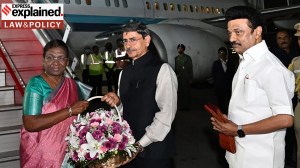From Nimmi’s Green Cadillac
Ismail Merchant, along with film-maker James Ivory and scriptwriter Ruth Prawer Jhabvala, has been part of the team that first made good by ...

Ismail Merchant, along with film-maker James Ivory and scriptwriter Ruth Prawer Jhabvala, has been part of the team that first made good by making India-based films to be screened in the West. It was much later that they discovered Henry James, E.M. Forster and period films — and then, of course, there was no looking back. Except that they have continued, ever since, to look back — at the past, pretty pastels and all.
My Passage from India, a memoir by film producer Merchant, is the story of how he made the journey, from the back seat of Nimmi’s green Cadillac convertible in Bombay, as a 13-year-old boy, the son of a textile dealer — to the West, and onward to the Academy Awards. A long journey, and surely one that must have had its ups and downs. But Merchant’s account, rather like his films, remains a series of mostly feel-good impressions — lavish photographs, uncontroversial anecdotes, and bite-sized accounts that move from film to film. Atmosphere there is in good measure — from the spice market at Nul Bazaar to the colourful chaos of Crawford Market; from the Tunda kebabs of Lucknow to the delicious feast of the iftehari. The India memories fly past in a rush of colour and noise: spices, mangoes, movies, Nargis and Lata.
Merchant later went to NYU, where he got a degree in business administration, did time in advertising, and then entered the world of film. Onward to Hollywood — and Merchant makes it appear like one long carousal ride. Of course, there are vivid bits of detail. Beginning with the shower of marigolds on the Cadillac as they made their way to the Barsaat premiere. Later, a gentle grumble about the English critic who wrote (quite aptly, I thought) of Nimmi’s Aan: “Aan is a film that goes aan and aan and aan.” And then, suddenly, we are with Merchant at the top of the Empire State building, where he is telling us: “This is New York and anything is possible.”
The problem is that he would make us believe that it was marigolds, marigolds, at least for most of the way. After all, surely over 40 films, even with a few Oscars thrown in, did not come as smoothly as that. But even the wheeling and dealing for financing, he seems to convey, is not really all that difficult if you put your mind to it — something or the other will always come up. In fact, Merchant on food manages to be more interesting than Merchant on film. The food bits are, for me, the most engaging parts of the memoir — from the Bareilly kebabs, stuffed with coriander and green chillies, to his mother’s homemade achaar that he offers the sceptical porter at the Gare de Lyon.
| My Passage from India By Ismail Merchant Roli Books Rs 695 |
The insights on life, struggles, and all that — made in passing — are little more than tired truisms. “I have always felt,” he tells us, “that success and failure are part of the same process, like life and death, and one has to accept that.” Nor is there
much introspection about the failures: “A film either works or it doesn’t,” he shrugs.
For Merchant, with his exhaustingly upbeat tone, everything is the stuff of legend — his legendary meals, their legendary triumvirate. Failures are glossed over (“I was, as usual, ahead of my time”). As for his own style, he never hesitates to remind us of his skills — “Appropriate locations have become one of the distinguishing features of our films, and through a combination of charm, guile and stubbornness, I have managed to gain access to places no filmmaker has ever been allowed to shoot before.”
In his introduction, Merchant has told us, with disarming pleasure in the telling, that there will soon be a plaque at a coffee shop, the Right Bank on Madison Avenue in New York, the place where the idea of the Merchant-Ivory partnership was first born some forty years ago. He goes on to tell us that although an entire generation of film audiences has grown up knowing only the period adaptations, but not the early work on films based in India. But if this memoir was meant to bridge that gap, it falls sadly short. For My Passage from India, much like his films, is colourful, glossy — and lightweight.
Photos




- 01
- 02
- 03
- 04
- 05



























